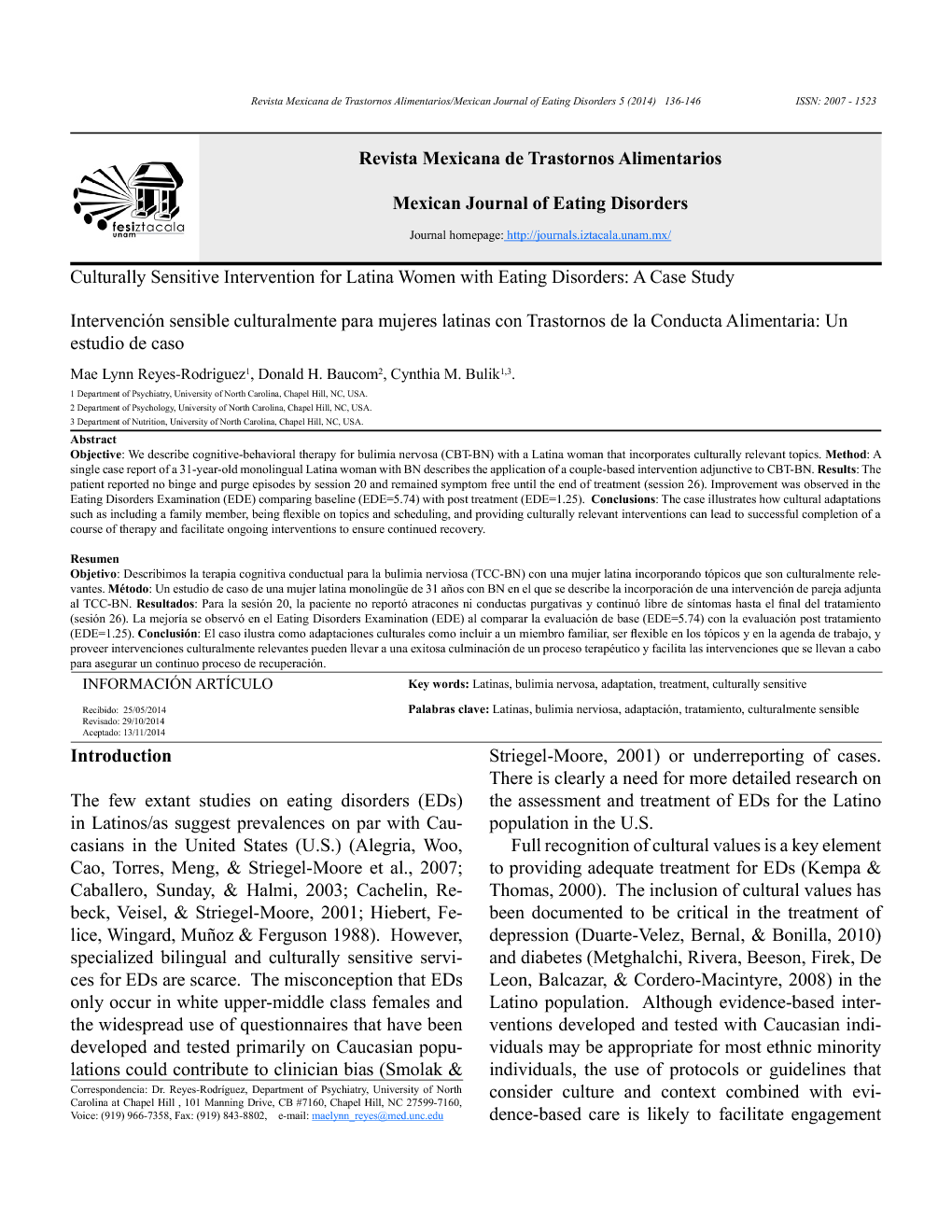The few extant studies on eating disorders (EDs) in Latinos/as suggest prevalences on par with Caucasians in the United States (U.S.) (Alegria, Woo, Cao, Torres, Meng, & Striegel-Moore et al., 2007; Caballero, Sunday, & Halmi, 2003; Cachelin, Rebeck, Veisel, & Striegel-Moore, 2001; Hiebert, Felice, Wingard, Muñoz & Ferguson 1988). However, specialized bilingual and culturally sensitive services for EDs are scarce. The misconception that EDs only occur in white upper-middle class females and the widespread use of questionnaires that have been developed and tested primarily on Caucasian populations could contribute to clinician bias (Smolak & Striegel-Moore, 2001) or underreporting of cases. There is clearly a need for more detailed research on the assessment and treatment of EDs for the Latino population in the U.S.
Full recognition of cultural values is a key element to providing adequate treatment for EDs (Kempa & Thomas, 2000). The inclusion of cultural values has been documented to be critical in the treatment of depression (Duarte-Velez, Bernal, & Bonilla, 2010) and diabetes (Metghalchi, Rivera, Beeson, Firek, De Leon, Balcazar, & Cordero-Macintyre, 2008) in the Latino population. Although evidence-based interventions developed and tested with Caucasian individuals may be appropriate for most ethnic minority individuals, the use of protocols or guidelines that consider culture and context combined with evidence-based care is likely to facilitate engagement in treatment and has the potential to enhance outcomes (Domenech Rodriguez, Baumann, & Schwartz, 2011; Miranda, Bernal, Lau, Kohn, Hwang, & La Framboise, 2005; Shea, Cachelin, Uribe, Striegel, Thompson, & Wilson, 2012).
The case report presented in this article was part of a National Institute of Mental Health NIMH-funded research study “Engaging Latino Families in Eating Disorders Treatment” (Reyes-Rodriguez, Bulik, Hamer, & Baucom, 2013). This case was part of formative work exploring the role of the family in EDs recovery in adult Latina women. The main objective of this case study was to explore the feasibility of family involvement, the appropriateness of assessment procedures, and the need for cultural adaptation of treatment for the target population, while considering language, immigration, level of acculturation and cultural values, lack of health insurance, and coordination of medical and family support using Latino community services. Permission was obtained from the patient and family member to present de-identified information for publication. Additional protection for the anonymity was achieved by omitting specific descriptive information about the case. This study was approved by the biomedical Institutional Review Board of the University of North Carolina at Chapel Hill.
This case study represents the first step in the development of a treatment model for Latina women with eating disorders in the U.S. It demonstrates the challenges of providing an evidence-based intervention to a patient with multiple disadvantages (i.e., low education, no documentation, and a lack of health insurance). It also illustrates how adaptations such as including the partner, being flexible on topics addressed and scheduling, adhering to cultural values of personalism and familism, and providing culturally relevant interventions can lead to successful completion of a course of therapy and also facilitate ongoing interventions to ensure continued recovery. Consistent with a previous study (Ishikawa, Carde-mil, & Falmagne, 2010), this case demonstrates the integration of personal, family, and cultural factors in shaping the conceptualization of suffering and healing. The therapist’s alignment with the client’s world view, such as therapist multicultural competence, is a key factor in treatment outcomes (Cabral & Smith, 2011). This case provides an example of the cultural adaptation process of evidence-based intervention in Latinos/as, which is applicable to other mental health conditions.


